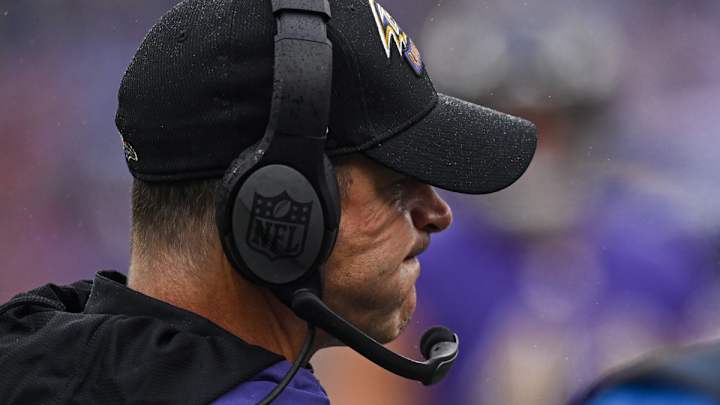John Harbaugh Breaks Down Controversial 4th-and-Goal Decision

In this story:
OWINGS MILLS, Md. —Ravens coach John Harbaugh is facing scrutiny again for gambling on a 4th-and-goal late in the Week 4 game against Buffalo Bills.
Instead of letting kick Justin Tucker attempt a short field goal, quarterback Lamar Jackson threw an interception in the end zone, which gave the Bills the ball on the 25.
Bills quarterback Josh Allen led a 12-play, 77-yard scoring drive capped by a 21-yard field goal by Tyler Bass that gave Buffalo the 23-20 win.
Habaugh has no regrets.
"I feel the same way as I felt during the game and after the game," he said. "I trust our players implicitly in everything. As a coach, I trust our offense to make plays and extend leads and all that; and I trust our defense to get stops, and I trust our special teams to make plays and flip field positions. So, you start with that. That’s what you always do. I think with that goes the obligation that the players trust me, too.
"They trust the coach, they trust the coaches to put them in the best possible position to win the game, whatever that might be. It’s not about a coach making a quote-unquote ‘safe decision.’"
The @Ravens have lost five consecutive games at home for the first time in team history.
— Todd Karpovich (@toddkarpovich) October 3, 2022
Baltimore needs a win against Cincinnati to get back on track and establish a home-field advantage once again.#RavensFlock https://t.co/ou1gHSU0XX via @toddkarpovich
Harbaugh said that if the Ravens kicked the field goal it would have provided a 3-point lead with four minutes left in the game.
The Bills would then get the ball back at the 25-yard line with an opportunity to go down the field and tie the game or win it with no time constraints. Buffalo also would have an opportunity to extend every drive until they get in field goal range with four downs.
"There’s nothing less safe in the National Football League than a three-point lead, a four-point lead, a five-point lead or a six-point lead," Harbaugh said. "That’s kind of been proven, and I trust our defense to get a stop with three points; I trust our defense to get a stop with three, seven or a tie game. Any one of those scenarios, I trust our defense to get the job done, and we were close to getting off the field, especially on that third down. So, we can do it that way, but the options were, now we’re in a situation where, if we score – and we’re right down there to score, we’re moving the football – now it’s a seven-point lead."
Instead of putting the Bills on the 25-yard line in a four-possession game with a field goal 75 yards away from the end zone, it’s a seven-point lead. Harbaugh thought the Ravens had a better chance of defending that lead and it was better for the defense to have a seven-point cushion in that situation.
The downside of that is that it’s a tie game, the Bills are at the two-yard line, and they’re only going to be looking at three downs because offenses who are behind are way more aggressive, he said.
"They’ve got nothing to lose; they’re going to go for it," Harbaugh said. "Just like against the Patriots, when you’re behind you throw the ball up, you have chances to get interceptions. But when you’re tied, you throw the ball up, you get an interception down there, you turn the ball over … we’re kicking a field goal, running the clock out and winning the game. Or, I think we have a great chance, and I completely trust our defense with the ball at the two-yard line to get a stop there."
If the Bills failed to convert, they would have punted to the Ravens to the 50-yard line, which gave Baltimore an opportunity to get into field goal range and win the game with no time left.
"We run the time out, and we kick the game-winning field goal, and that was the thinking," Harbaugh said. "So, rather than put them in a situation for a field goal in that situation at the 25-yard line, with four minutes left, I’m thinking either seven, or I’m thinking the ball is at the two-yard line, and I really stand by that decision, 100 percent.”
In this case, it didn't work and questions still abound.

Twitter: @toddkarpovich Email: todd.karpovich@gmail.com Skype: todd.karpovich Todd Karpovich has been a contributor for ESPN, Forbes, the Associated Press, Lindy's, and The Baltimore Sun, among other media outlets nationwide. He is the co-author of “If These Walls Could Talk: Stories from the Baltimore Ravens Sideline, Locker Room, and Press Box,” “Skipper Supreme: Buck Showalter and the Baltimore Orioles,” and the author of “Manchester United (Europe's Best Soccer Clubs).” Karpovich, a Baltimore native, is a graduate of Calvert Hall College high school, Randolph-Macon College in Virginia, and has a Masters of Science from Towson University.
Follow @toddkarpovich